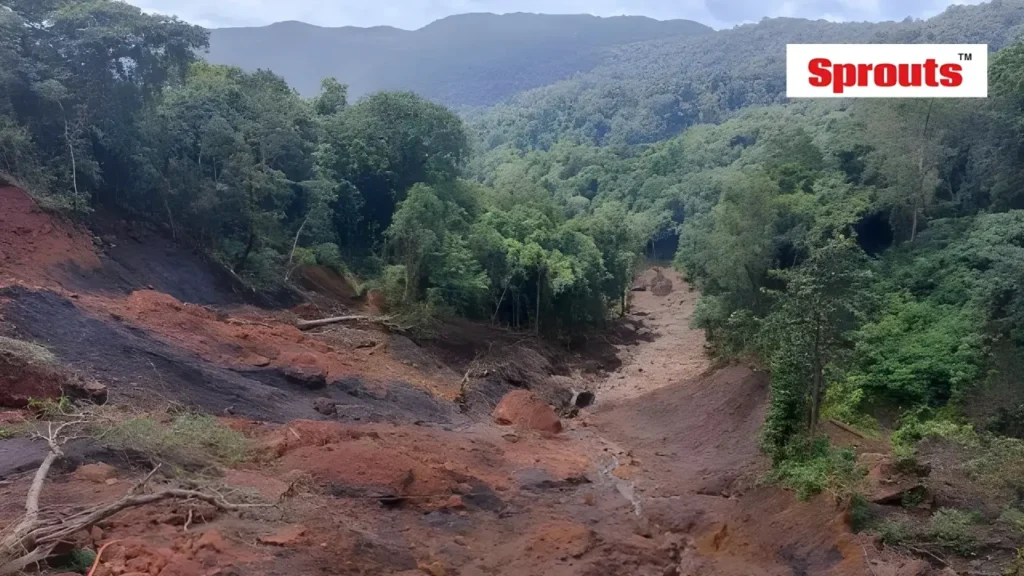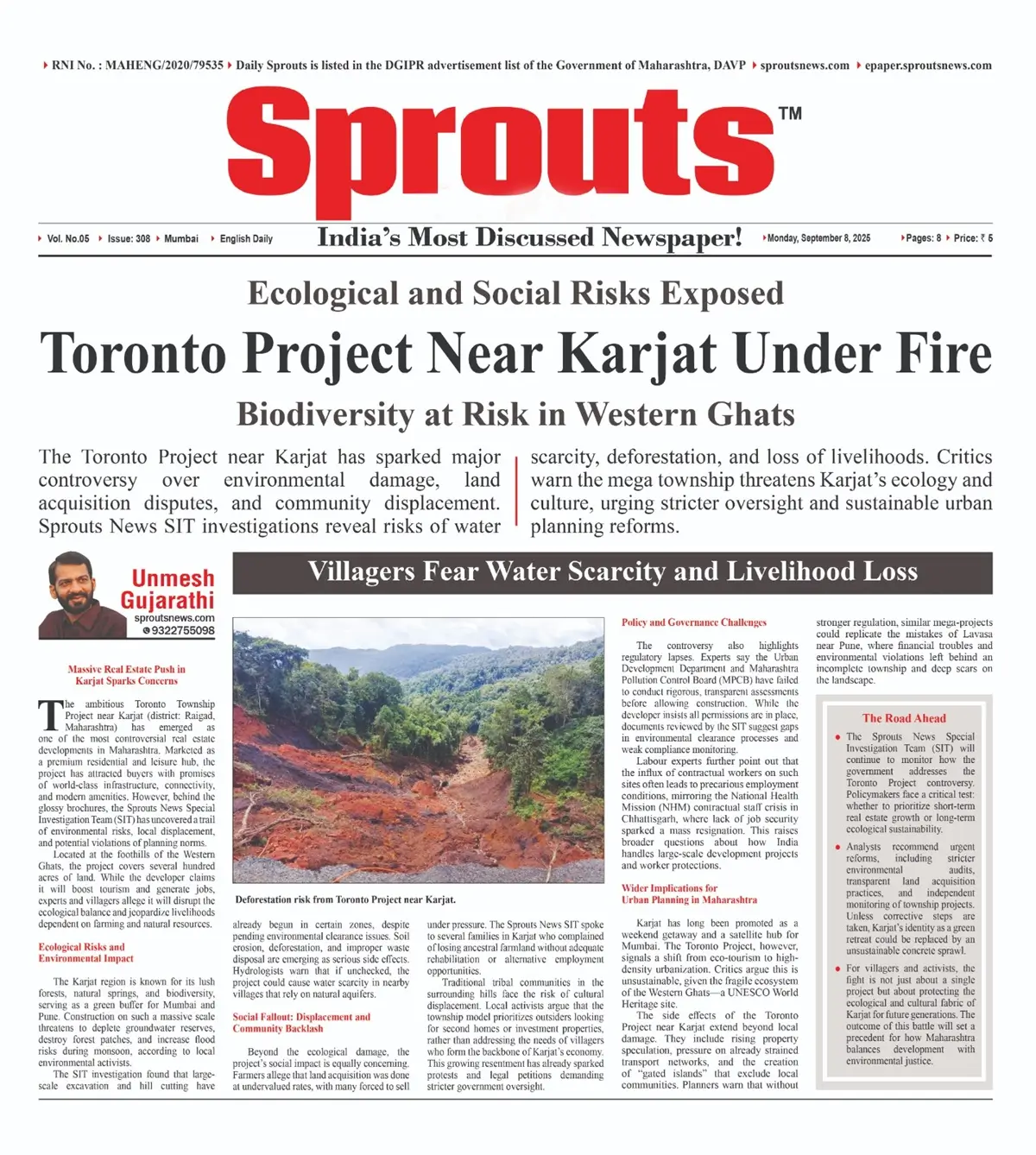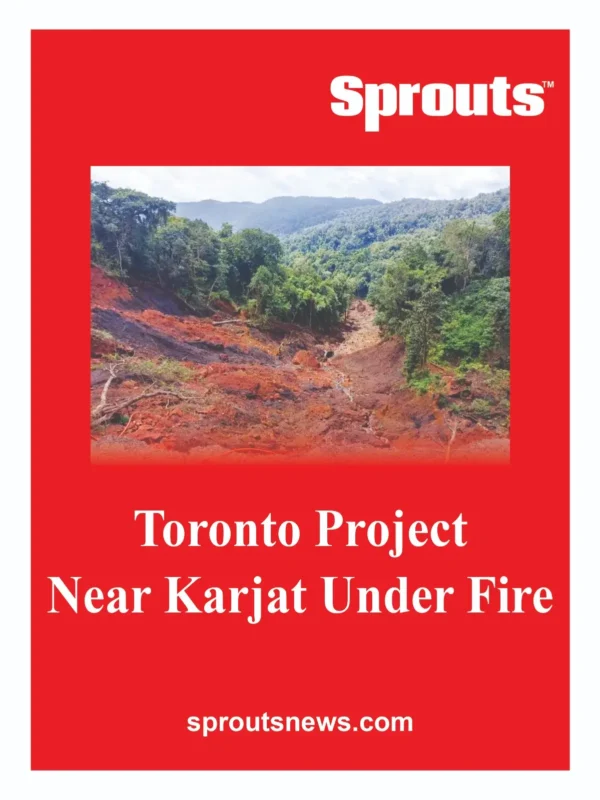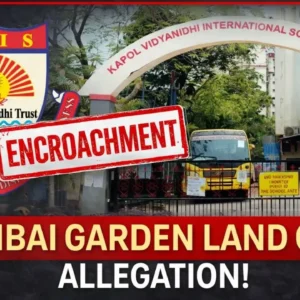Toronto Project Near Karjat Under Fire
• Ecological and Social Risks Exposed
• Biodiversity at Risk in Western Ghats
• Villagers Fear Water Scarcity and Livelihood Loss
Unmesh Gujarathi
Sprouts News Exclusive
Contact: +91 9322755098
- Toronto Project Near Karjat Under Fire
- • Ecological and Social Risks Exposed
- • Biodiversity at Risk in Western Ghats
- • Villagers Fear Water Scarcity and Livelihood Loss
- Toronto Township Project: Massive Real Estate Push in Karjat Sparks Concerns
- Ecological Risks and Environmental Impact
- Social Fallout: Displacement and Community Backlash
- Policy and Governance Challenges
- Wider Implications for Urban Planning in Maharashtra
- The Road Ahead
The Toronto Project near Karjat has sparked major controversy over environmental damage, land acquisition disputes, and community displacement. Sprouts News SIT investigations reveal risks of water scarcity, deforestation, and loss of livelihoods. Critics warn the mega township threatens Karjat’s ecology and culture, urging stricter oversight and sustainable urban planning reforms.
Click Here To Download the News Attachment
Toronto Township Project: Massive Real Estate Push in Karjat Sparks Concerns
The ambitious Toronto Township Project near Karjat (district: Raigad, Maharashtra) has emerged as one of the most controversial real estate developments in Maharashtra. Marketed as a premium residential and leisure hub, the project has attracted buyers with promises of world-class infrastructure, connectivity, and modern amenities. However, behind the glossy brochures, the Sprouts News Special Investigation Team (SIT) has uncovered a trail of environmental risks, local displacement, and potential violations of planning norms.
Located at the foothills of the Western Ghats, the project covers several hundred acres of land. While the developer claims it will boost tourism and generate jobs, experts and villagers allege it will disrupt the ecological balance and jeopardize livelihoods dependent on farming and natural resources.
Ecological Risks and Environmental Impact
The Karjat region is known for its lush forests, natural springs, and biodiversity, serving as a green buffer for Mumbai and Pune. Construction on such a massive scale threatens to deplete groundwater reserves, destroy forest patches, and increase flood risks during monsoon, according to local environmental activists.
The SIT investigation found that large-scale excavation and hill cutting have already begun in certain zones, despite pending environmental clearance issues. Soil erosion, deforestation, and improper waste disposal are emerging as serious side effects. Hydrologists warn that if unchecked, the project could cause water scarcity in nearby villages that rely on natural aquifers.
Social Fallout: Displacement and Community Backlash
Beyond the ecological damage, the project’s social impact is equally concerning. Farmers allege that land acquisition was done at undervalued rates, with many forced to sell under pressure. The Sprouts News SIT spoke to several families in Karjat who complained of losing ancestral farmland without adequate rehabilitation or alternative employment opportunities.
Traditional tribal communities in the surrounding hills face the risk of cultural displacement. Local activists argue that the township model prioritizes outsiders looking for second homes or investment properties, rather than addressing the needs of villagers who form the backbone of Karjat’s economy. This growing resentment has already sparked protests and legal petitions demanding stricter government oversight.
Policy and Governance Challenges
The controversy also highlights regulatory lapses. Experts say the Urban Development Department and Maharashtra Pollution Control Board (MPCB) have failed to conduct rigorous, transparent assessments before allowing construction. While the developer insists all permissions are in place, documents reviewed by the SIT suggest gaps in environmental clearance processes and weak compliance monitoring.
Labour experts further point out that the influx of contractual workers on such sites often leads to precarious employment conditions, mirroring the National Health Mission (NHM) contractual staff crisis in Chhattisgarh, where lack of job security sparked a mass resignation. This raises broader questions about how India handles large-scale development projects and worker protections.
Also Read: Pune’s ₹200Cr Land Scam Exposed: Rama Group & Vardhaman in EOW Net.
Wider Implications for Urban Planning in Maharashtra
Karjat has long been promoted as a weekend getaway and a satellite hub for Mumbai. The Toronto Project, however, signals a shift from eco-tourism to high-density urbanization. Critics argue this is unsustainable, given the fragile ecosystem of the Western Ghats—a UNESCO World Heritage site.
The side effects of the Toronto Project near Karjat extend beyond local damage. They include rising property speculation, pressure on already strained transport networks, and the creation of “gated islands” that exclude local communities. Planners warn that without stronger regulation, similar mega-projects could replicate the mistakes of Lavasa near Pune, where financial troubles and environmental violations left behind an incomplete township and deep scars on the landscape.
The Road Ahead
The Sprouts News Special Investigation Team (SIT) will continue to monitor how the government addresses the Toronto Project controversy. Policymakers face a critical test: whether to prioritize short-term real estate growth or long-term ecological sustainability.
Analysts recommend urgent reforms, including stricter environmental audits, transparent land acquisition practices, and independent monitoring of township projects. Unless corrective steps are taken, Karjat’s identity as a green retreat could be replaced by an unsustainable concrete sprawl.
For villagers and activists, the fight is not just about a single project but about protecting the ecological and cultural fabric of Karjat for future generations. The outcome of this battle will set a precedent for how Maharashtra balances development with environmental justice.



















